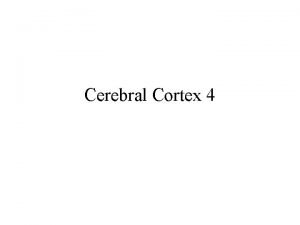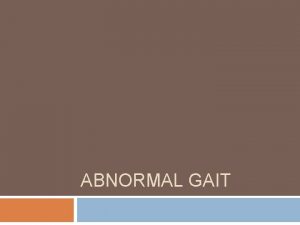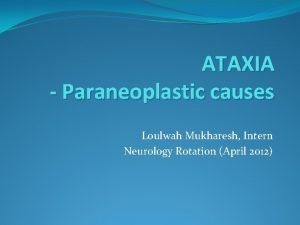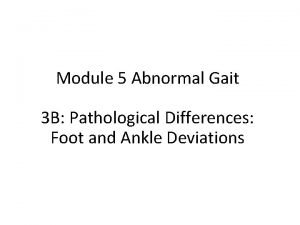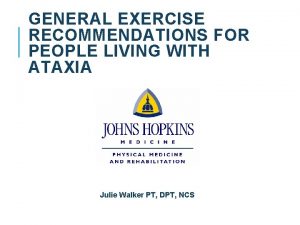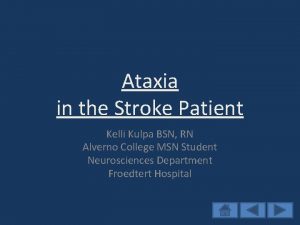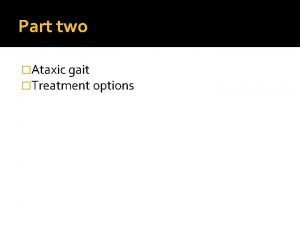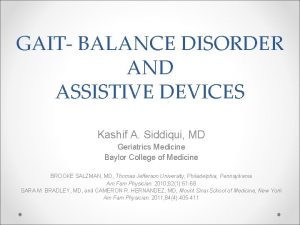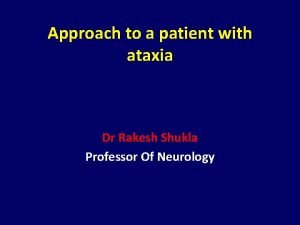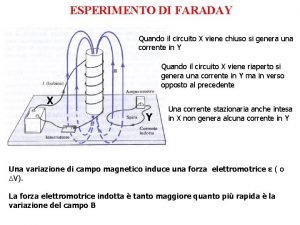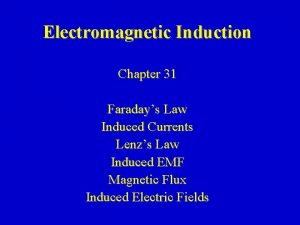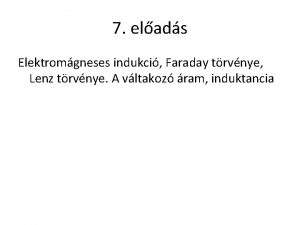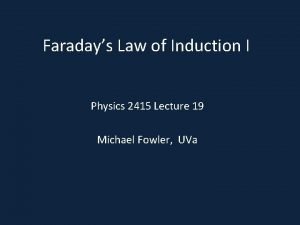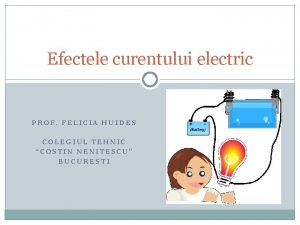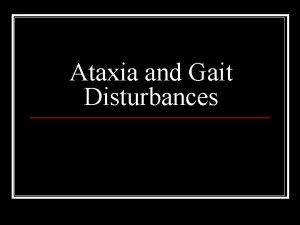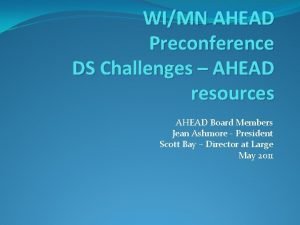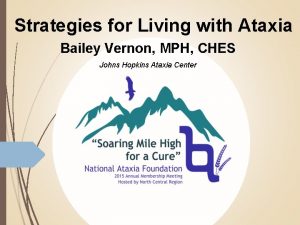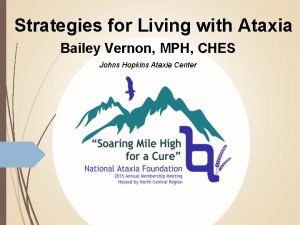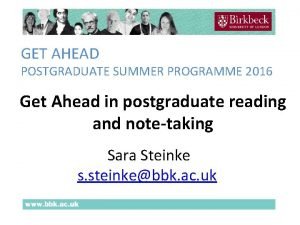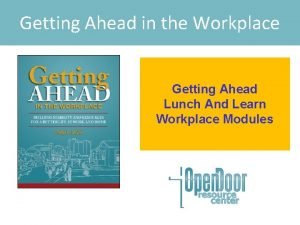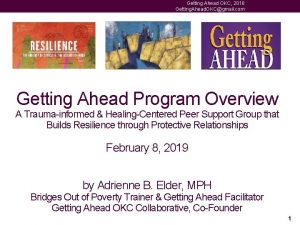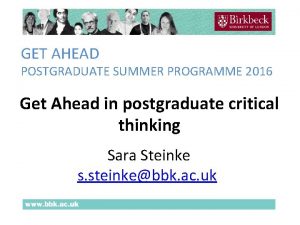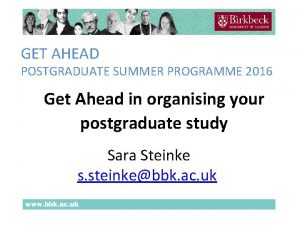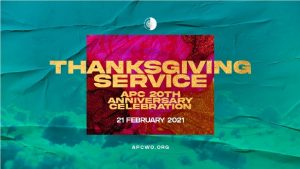DETOURS AHEAD LIVING WITH ATAXIA Nygel Lenz DISCLAIMER



























- Slides: 27

DETOURS AHEAD: LIVING WITH ATAXIA Nygel Lenz

DISCLAIMER § The information provided by speakers in any presentation made as part of the 2016 NAF Annual Ataxia Conference is for informational use only. § NAF encourages all attendees to consult with their primary care provider, neurologist, or other health care provider about any advice, exercise, therapies, medication, treatment, nutritional supplement, or regimen that may have been mentioned as part of any presentation. § Products or services mentioned during these presentations does not imply endorsement by NAF.

PRESENTER DISCLOSURES § Nygel Lenz § No relationships to disclose or list

DETOURS AHEAD: LIVING WITH ATAXIA • I am Nygel Lenz. I am 41, and I have Friedreich’s Ataxia (FA). • Ataxia is a detour that we all share. I would guess, from leading a support group, that everyone here faces obstacles and detours—sometimes on a daily basis.

ME AT AGE 8 When I was growing up, I was a fairly typical, active boy. Basically, I was outside doing some sort of activity whenever I had an opportunity. Scoliosis was the first symptom that I had, which is consistent with FA, but I had no clue what ataxia or FA was. I continued being active after being diagnosed with scoliosis when I was 11.

SCOLIOSIS SURGERY • I had scoliosis surgery at 15. I had rods placed in my back to straighten it. I was in a lot of pain, and my recovery was long. • As soon as I got up and started walking again, I realized that my balance was different. Walking straight, having my feet go where my brain directed them became an issue. • I mistakenly thought that the surgery led to my balance problem or ataxia. I know that it scared me! • I was also told after surgery that they detected a heart murmur, which was new.

• The beginning of my sophomore year in high school I began seeing a neurologist. • I went all the way through high school undiagnosed. I was very shy with few friends and fearful that people might notice that my walking was getting worse. Thankfully, only a few friends noticed, and my closest friends knew. • I had already been told by the orthopedist that I would no longer be able to play sports for fear that the rods might break. Thus, my promising athletic career ended. Ha-ha!

COLLEGE, CAREER, ETC. • While in high school, I wanted to go to college, join the Air Force ROTC and become a pilot in the Air Force. That dream kept becoming more distant… • My best friend and I “chose” the University of Florida. In hindsight, I was really lucky to be accepted. I had great grades, was in clubs, but not enough to get in today. • Prior to getting accepted, I had become interested in becoming a lawyer. So, I chose criminology as a major.

FINALLY DIAGNOSED! • I was finally diagnosed at 19 in 1994, four years after the scoliosis surgery. • At the time, I was simply happy to have a name for my problem, a diagnosis. I did not really know what it meant. • I did not look up any information. The obvious answer is that I did not want to know. I wanted it to go away and allow me to be “normal” again, able bodied.

MY FIRST DRUG TRIAL • My neurologist suggested participating in a research study. I was thrilled! • Unfortunately the trial drug made my symptoms worse. • I also saw other people at the clinic using wheelchairs and with speech problems— much like me now. This frightened me. I did not know anyone else with Friedreich’s ataxia or any other disability, for that matter. • I remember quite vividly telling my dad when I was 20 that I would rather be dead than be in a wheelchair. My, how things have changed.

CAREER CHANGE • Coincidentally, I was taking a research methods class at the time. I began thinking that there are lot of lawyers and therefore a lot of competition. • Also, I was very interested in research. • I changed my mind about law school and began thinking about going to graduate school and becoming a professor…To conduct research and teach.

• I began using a cane just before my senior year of college. It was extremely difficult to accept. • However, I noticed that people were very helpful, holding doors, etc. No longer did I feel like people might be staring at me because they thought I was drunk. • Accepting the cane was very difficult, but it made accepting a walker and eventually a full-time wheelchair that much easier.

PROGRESSING • After graduating, I moved back home with my mother. • I began graduate school and did very well. I was able to publish a research article in one of the top peer-reviewed journals. • FA has taught me to prepare for change! It changes my body, my abilities. Therefore, it alters my life. Good and bad. • I began using a walker about a year into graduate school, two years after the cane. It was a little embarrassing at first, but I managed.

BUMPS IN THE ROAD • After graduate school, I had some big problems. • I encountered my first experience with atrial fibrillation. My doctor admitted me to a hospital, and I was told that there were a variety of treatment options/medications. I was not used to that. TREATMENT options! • My balance worsened to the point where I was falling and could not get back up. • I had to begin using a wheelchair full time. • I also wanted to find a job. • I had a car, an SUV. Unfortunately, I was no longer able to get the wheelchair in-and-out of the vehicle by myself and I had to stop driving.

I FOUND THE NAF AND A SUPPORT GROUP • My initial thought was, “Hey, these folks can help me figure out how to get around and work. ” I really did simply want to know, how do other people do it? • Finding the NAF and a support group truly changed my life. It was the first time that I met other people with ataxia. I was able to speak to them and have them understand me and my situation. Actually, we did not even need to say a word to each other. It was very comforting. A home. I am certain that many of you feel that way right now. • That feeling is critical. That is the feeling that kept me coming to the NAF conferences for nine years straight. (I have missed some recently, for good reasons. )

CLIMBING BACK UP • The leader of my support group was planning to step down during my third meeting. No one else offered to step up, so I did. • Leading my local support group was extremely rewarding. I love meeting people with ataxia and helping as best I am able. I sometimes even have good advice! People with ataxia are awesome and have the best senses of humor. • The support group also boosted my confidence and led to me finding a job in 2004 (and appealing and being granted paratransit service).

THE ATAXIA CLUB • I also attended my first NAF conference in 2002 in St. Louis. There, for the first time I met others with Friedreich’s ataxia. Aaron Kittel was the first. There were others too. However, he was first, and we kept in touch. I will never forget that. I will also never forget him, as he passed away about five years ago. • I have known many ataxians that have passed away. It is the hardest part of ataxia. Not only are you losing a friend, a loved one, you are reminded of your fate. I hate ataxia! • This makes us more desperate for treatments and cures.

GOOD DAYS AND BAD DAYS • I must mention that like most of you can relate, I have good days and bad days. This can be as heavy as grieving the loss of a friend or an ability (many days). Or, as simple as getting the right amount of sleep, getting your shoes on the first time, tossing a piece of paper in the garbage and it going in, etc.

LOSSES AND GAINS • Dating was difficult. It also dawned on me that I probably would never have children. I did not want to pass on the gene. I also feared not being able to play with my child/children. • I have a few very good, able-bodied friends. And they were and are very supportive. • One friend, Andy actually attended a few NAF conferences with me. • Andy was planning to move to San Francisco in January 2008.

STUCK IN PLACE… FOR A REASON • My goal was to move to San Francisco also. It is a big city with lots of things happening, plenty of transportation. All that I had to do was sell my condo. • For many reasons, I was only able to visit San Francisco a few times. • I was very depressed about this. Things were not the same. I did still have my job, fortunately. I did lose my roommate. • I was bored. I had friends and family. But I needed more. I wanted more. Finally, in 2009 I made things happen, and I realized why I still lived in Clearwater, Florida.

I MET MY FUTURE WIFE! • She, Carolyn, changed everything and made me a better person. • I could not believe my good fortune. She makes me so happy every day. I now wish for a treatment and cure not only for me but to make things easier for her. • She does all the physical work around our house. She does not complain, but I often do not feel like the “man”. I want to help. I wish that we could share a 50/50 workload.

BACK TO SCHOOL • In 2010 I went back to graduate school, because I wanted to be a professor, still. I attended Florida State University online to get a second Master in Criminal Justice. • I finished in 2012 and was hired as an adjunct professor at American Public University. It is all done online.

GOOD DETOURS! • There are certainly many good detours in life. Marrying Carolyn tops my list. We love to travel, watch movies, go out to eat, spend time with family and friends. She loves the beach, yoga and more. • We went to Europe in 2012 when we both finished graduate school. • We recently moved into a house that we bought. We love it! We are closer to the beach and to Carolyn’s job. We also have an awesome, sweet pug. The pug, Angel, cannot do a single service-animal thing, but she is helpful emotionally!

POSITIVE ATAXIA DETOURS • My support group, The Tampa Bay Ataxia Support Group, was honored to host the 2005 NAF Annual Membership Meeting in Tampa, Florida. • That was a wonderful experience for the ataxia community, but it was also quite empowering on a personal level. I had a lot of responsibilities in terms of leading fund raisers, seeking guest speakers, finding a hotel, speaking, etc. This is only one example of something I never would have done if I did not have FA. • In the middle of planning the meeting, I got my assessor job. I appealed to get paratransit service to get to work. I became part of the bigger world. This was very empowering!

• We are all different and at different stages in our journey with ataxia and in life. • I do not want to speak for anyone, but I believe that every individual with ataxia wants to do what he/she can for him/herself and for the ataxia community. We all have various talents and skills. Use them for your health, happiness and to fight ataxia!

WEDDING 2011 AND LONDON 2012

 Difference between cerebellar ataxia and sensory ataxia
Difference between cerebellar ataxia and sensory ataxia Optic ataxia
Optic ataxia Normal gait types
Normal gait types Best gaze
Best gaze Loulwah mukharesh
Loulwah mukharesh Gait ataxia spokane
Gait ataxia spokane Exercises for ataxia
Exercises for ataxia Limb ataxia
Limb ataxia Ataxia
Ataxia Hepatic encaph
Hepatic encaph Frontal lobe epilepsy mri
Frontal lobe epilepsy mri Lenz
Lenz Faraday's law vs lenz's law
Faraday's law vs lenz's law Lenz’s law
Lenz’s law Legge di faraday lenz
Legge di faraday lenz Lenz rule
Lenz rule Lola rennt unterricht
Lola rennt unterricht Faraday
Faraday Heinrich f.e. lenz
Heinrich f.e. lenz Define faraday's law
Define faraday's law Tattoo praktikum
Tattoo praktikum Ostern wenn der lenz erwacht
Ostern wenn der lenz erwacht Faraday törvénye
Faraday törvénye Lenz's law
Lenz's law Lenz’s law
Lenz’s law Efectele curentului electric
Efectele curentului electric Regra do tapa fisica
Regra do tapa fisica Wet van lenz
Wet van lenz

